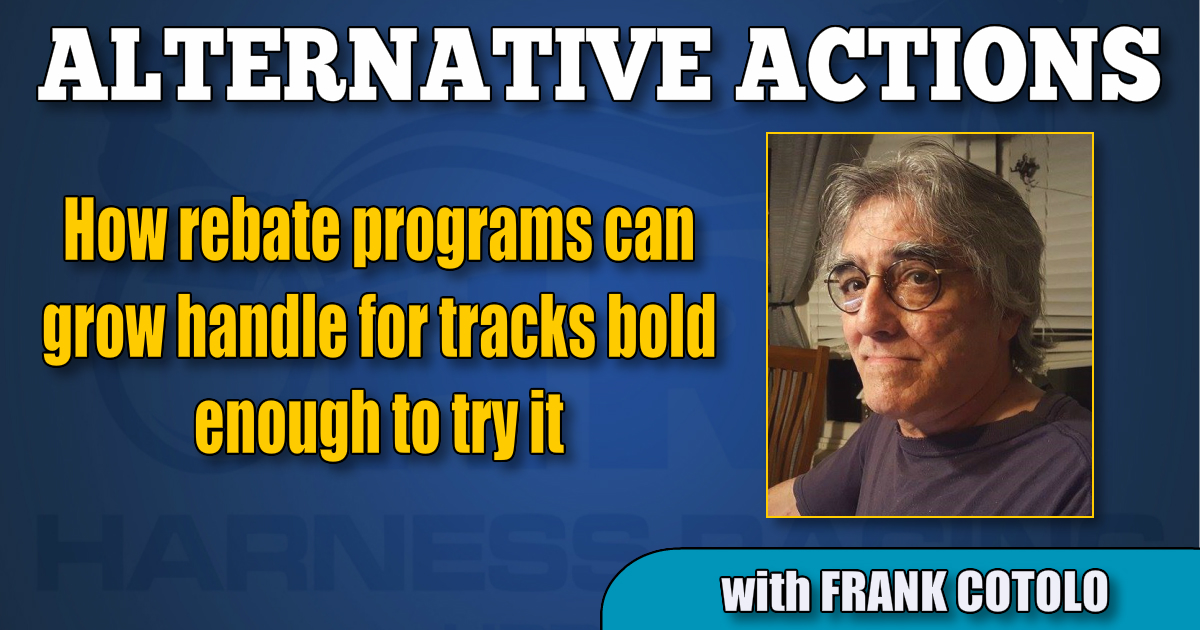Go rogue outside of the box: Part 2 – paving the money trail
How rebate programs can grow handle for tracks bold enough to try it.
by Frank Cotolo
In part one (full story here) we encouraged track administrations to create outrageous promotions, to go with any wild ideas they had and pursue them as never before. That doesn’t mean the track bosses need to hire a six-figure promotion team that costs more than its input could ever produce. Simply, it means the track public relations (PR) antics should directly target the betting public in order for the track’s staff to develop a bond with the sport’s audience (which is, by definition, “public relations”).
As AA continually impresses, the best PR antics have to do with gifts, preferably those with value, preferably value that translates into dollars. The best dollar-value gifts are dollars themselves. All old-school gifts and prizes offered to the public were lame compared to money, because money is the strongest image in a bettor’s mind when gambling on anything.
A few years back, track PR departments that were still giving out hats and shirts also strongly implied to the public that the excitement of watching horses and drivers compete in races was alone worth the price of admission to a pari-mutuel track. While that was becoming a futile device and the crowds were fading, a new brand of betting operations began to grow elsewhere.
Enter off-shore betting (OSB) accounts.
OSB companies, loyal to any breed of horse racing, were soliciting clients using the best trio of value gifts available — money, money and money. These operations scouted for bettors that would open accounts and wager through the new facilities, doing so with money as the bait. Thus was born the rebate: money paid to the account holder based on his or her losing wagers.
Bettors listened with rapt attention when OSB companies said, “If you are betting horse racing anywhere without a regular rebate on your losing wagers, you are missing out.”
The point is clearly that money is what the account holder will collect on winning bets and earn on losing bets.
The notion touched a nerve that no pari-mutuel racetrack knew even existed. It was not long before OSBs were signing up all levels of pari-mutuel players. Their go-for-the-throat promises were perfect, offering more than the money bettors risked by playing.
OSBs did not stop with standard rebates, either; they offered additional cash-based rewards. They boasted about rebates within rebates for particular types of wagers and promised that “over months of betting [a player] will see a significant boost in a bankroll.”
That promise uses all of the words that resonate in the ears of bettors. OSBs understand bettors want to make money and are ready to lose money trying, and they understand and wish to assist with money because they want us to stay in play.
REBATES RETURNS
Giving cash rebates in one form or another is never a true expense to a pari-mutuel operation. However a track PR team puts together a program that gives customers a rebate, that program will wind up costing a pittance. Aside from free cash becoming a business expense, there is a bigger return on investment for the track because bettors will use rebate money one way — to keep betting.
Here’s a new type of “churn”; a track gives rebates and the recipients put the cash back into the betting pools, where racetracks get their share of betting income. It is brilliant; it is the purist definition of the old adage: “You have to spend money to make money.”
Once the word is out, the “rebate” tracks could create new bettors, but also get back bettors that may have left. Moreover, rebates will attract bigger bettors, the kind that truly can move numbers in pools.
As well, a rebate program will do more than a straight-out lottery-type money contest because everyone is going to lose bets, so everyone is eligible to get rebates. In a lottery-type cash contest there is one lucky winner — a person all of the losers pelt to pieces in their imaginations because the one winner was not any of them.
AA suggests racetrack administrations look into the details of creating a rebates program simply by studying how any betting organization sets up a system. Think it through, create it and promote it all over your raceway. Advertise it in HRU and Daily Racing Form and with prominent banners and floating ads on your website and at ADWs.
Is that out of the box, or what? Something so simple as giving money back to bettors so they could continue to pour money into the pools that keep a racetrack open is, indeed, radical.
This is the explosive element that defines the process known as “thinking outside of the box.” Racetrack PR departments should be inspired to create a program that blows up “the box” itself. Not only won’t there be a box any longer, there will be no borders to the territory revealed from the explosion.
Who knows what spinoffs may come from it and how profitable PR programs may become? No one knows and no one will know unless one track goes rogue, experiments, and grabs the attention of the people keeping them in business.

















